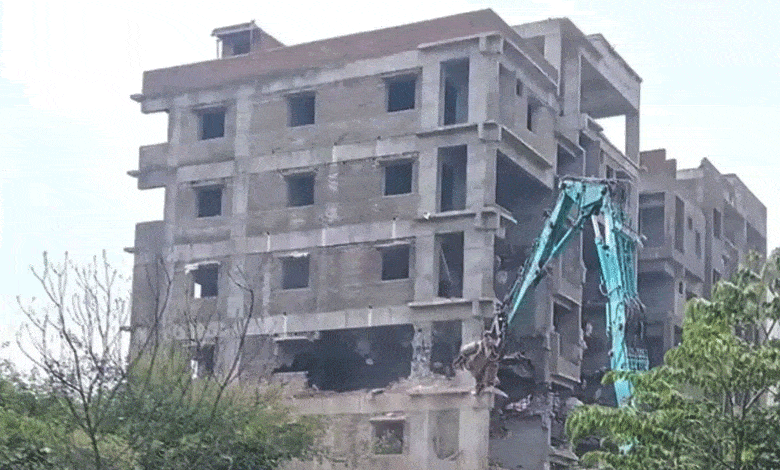No Construction Near Lakes and Canals Without HYDRA NOC: Government’s New Directive
Which has been contributing to flooding and environmental degradation in the city.

Hyderabad: In a significant move aimed at curbing illegal constructions and preserving water bodies, the state government is reportedly set to implement new regulations that will make it mandatory to obtain a No Objection Certificate (NOC) from HYDRA (Hyderabad Urban Development Regulatory Authority) for any construction activities near lakes, canals, or other water bodies in Hyderabad and surrounding areas.
This decision comes in response to growing concerns about unregulated construction near sensitive ecological zones such as lakes, canals, and stormwater drains, which has been contributing to flooding and environmental degradation in the city. In recent years, Hyderabad has experienced several incidents of urban flooding, largely attributed to the shrinking of water bodies and obstruction of natural drainage channels due to unauthorized constructions.
Mandatory NOC from HYDRA:
Under the proposed changes, builders and property developers will need to secure an NOC from HYDRA before proceeding with any construction activity in areas that fall near lakes, tanks, and canals. This NOC will certify that the proposed construction does not violate any environmental guidelines and is in compliance with zoning regulations intended to protect water bodies.
Sources close to the government suggest that the new rules will be stricter in areas that have been identified as prone to flooding or that serve as natural drainage pathways. The regulations are expected to include provisions for the safeguarding of buffer zones around lakes and canals to prevent encroachments, which have become a major issue in Hyderabad’s urban sprawl.
A Response to Urban Flooding:
The decision to involve HYDRA in granting permissions is seen as a preventive measure to avoid the city’s worsening flood situation, which has repeatedly made headlines in the monsoon season. Encroachments near water bodies, coupled with the improper planning of drainage systems, have left several areas vulnerable to flooding during heavy rainfall. Urban planners have been vocal about the need to restore and protect natural water channels and lakes to manage the city’s water flow and avoid future disasters.
In the past, there have been numerous instances where buildings were constructed in violation of environmental norms, with some even being erected right on top of drainage canals. These illegal activities have often led to the blockage of natural water channels, exacerbating waterlogging issues in the city.
Potential Impact on Real Estate and Urban Planning:
The real estate sector is likely to see a significant impact from this decision. Many developers have been accused of constructing buildings too close to water bodies, often bypassing environmental clearances. The new rule will bring a halt to any ongoing projects that do not have the required NOC from HYDRA, potentially causing delays in construction timelines.
At the same time, it may also encourage developers to adopt more sustainable building practices that align with the city’s environmental goals. With stricter oversight, Hyderabad’s development trajectory may shift towards more eco-friendly, regulated construction that respects the natural landscape.
Government’s Commitment to Environment and Safety:
The government’s focus on ensuring that HYDRA NOCs are a prerequisite for construction near water bodies indicates its broader commitment to sustainable urban development. In addition to preserving the environment, this move will also help mitigate safety concerns for residents living in areas prone to water-related hazards.
Public officials have reiterated that these steps are essential for the long-term health of the city, particularly as Hyderabad continues to expand rapidly. Balancing urban growth with environmental conservation is key to preventing future disasters and ensuring a better quality of life for residents.
The Road Ahead:
The implementation of these rules is expected to face some resistance, particularly from builders and developers who may find the process cumbersome. However, the government is determined to enforce the regulations strictly and has indicated that violations will result in penalties, including the demolition of unauthorized constructions.
Urban planners and environmentalists have welcomed the decision, viewing it as a step in the right direction to preserve Hyderabad’s water bodies and prevent further environmental degradation. The emphasis on securing an NOC from HYDRA will likely bring more transparency and accountability to the construction process, ensuring that future developments are in harmony with the city’s natural resources.
More details regarding the extent of the buffer zones and the specific areas where these new regulations will apply are expected to be released by the government soon. In the meantime, builders and developers are advised to consult with HYDRA before commencing any new projects to avoid legal complications and ensure compliance with the new regulations.
